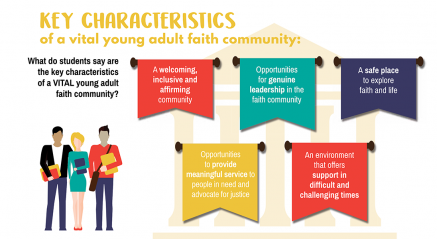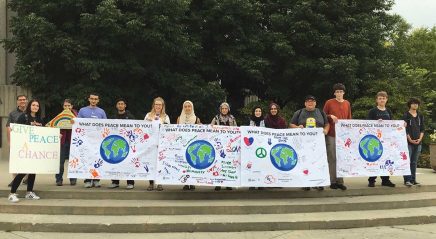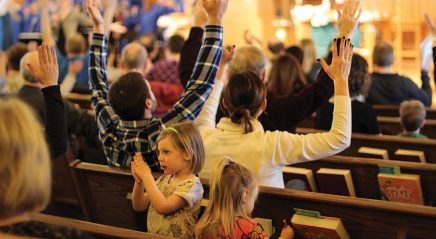Rachel Young Binter is pastor of the Corner House, the Lutheran campus ministry of the University of Wisconsin–Milwaukee. She’s also a therapeutic yoga instructor, Reiki practitioner and meditation guide. Living Lutheran spoke with her about how these spiritual practices inform her ministry, as well as the importance of prioritizing spiritual self-care and intentional connection with God.
Living Lutheran: You recently helped lead an ELCA Young Adult Ministry retreat in your capacity as both a speaker and a leader of spiritual practices. Tell us more about how these practices are incorporated into your leadership and ministry.
Young Binter: What I love about Christianity is that it takes seriously the idea that salvation cannot be found apart from our embodied life. It is our bodies that bear the forces of suffering and oppression and death in this world, so God comes into the body, God inhabits the world from the place of flesh and blood, to redeem us and set us free. Spiritual liberation is always connected to bodily liberation—to feeding the hungry, healing the sick, setting the prisoner free, welcoming the shamed and marginalized and sharing material wealth in a way that allows everyone access to life.
We believe in the resurrection of the body and a new heaven and a new earth. It is the created world, not just the spiritual realms, that are raised from the dead, because God loves what God has made.
In this time in our life on earth many of us have been distanced from the holiness of the created world and our created selves. We no longer live tightly tethered to the seasons of the earth, eat directly from the land, honor the cycles of light and dark, or experience the kind of quiet rest that speaks in dreams and visions. We push and push past the limits of our fatigue, take in more information in a day than we can digest and are asked to disregard the truths rising up within our bodies. I believe this is why so many young adults find themselves anxious.
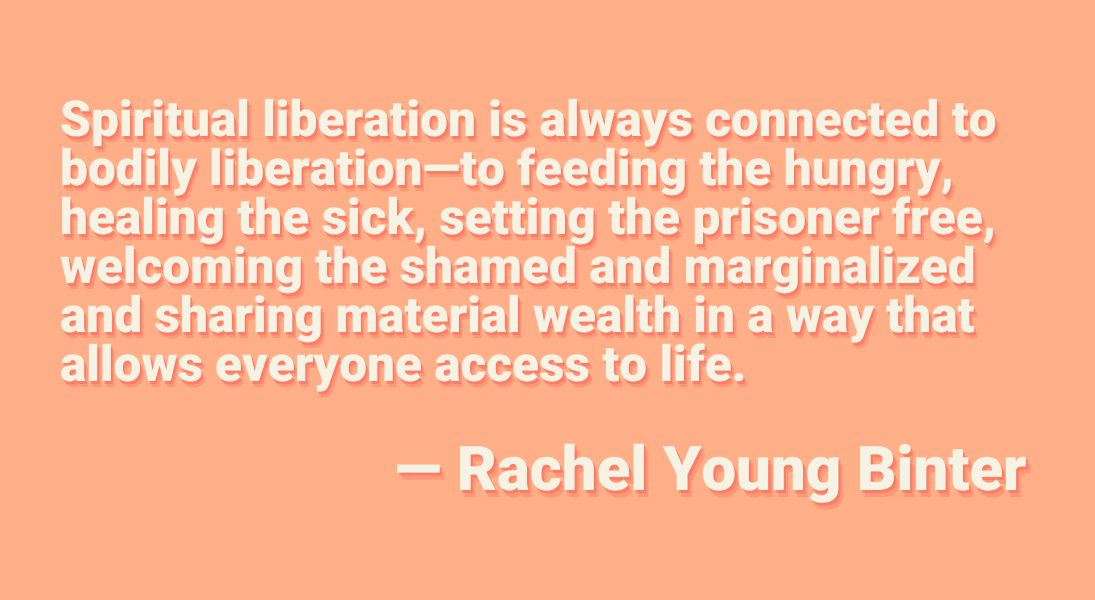
So doing ministry that honors the body and allows young people to pause and listen into the deeper reservoirs of spirit and holiness inside of them is critical. It is even more critical in the spiritual healing of those whose bodies have been shamed and named as sinful because of their LGBTQIA+ identities, people with disabilities who have struggled for full inclusion in the spaces they occupy, or those who have lived with the violence of racial oppression.
In my ministry, therefore, we offer opportunities each week to reorient ourselves to the body as a site of God’s presence and liberation. We begin worship feeling our feet on the earth, the weight of our bodies on our chairs, and allowing what we are holding in our shoulders to release. We breathe in the love of God in our midst, and we exhale anything we brought with us that’s keeping us from that love, so we can arrive fully present to worship. It’s simple, but it creates a huge shift in the energy in the room.
In what ways do you connect with God on your own time?
There are times I set aside to intentionally feel God’s presence. I meet monthly with a brilliant spiritual director who has the ability to guide me with honesty and humor toward a right relationship with what God is stirring up in me. I take time to read a devotion before bed and ask for God’s presence, guidance or healing in the lives of others, the world and my own life.
One of my students has given me the wisdom to never forget myself as I pray, and I have come to appreciate that humble necessity. I also make time for meditation, drawing or other spiritual practices as I am able or feel the pull.
Mostly, however, I try to see the connection to the holy throughout my day. I try to see God in the quiet rhythm of making coffee in the morning, throwing on my boots and putting seed in the bird feeder and watching the life gather outside my kitchen window, seeing sun sparkling on the water of Lake Michigan as I drive to work, reading poems or Scripture to plan worship and Bible study, and meeting the holy, holy ground of the hearts of young adults as they wander into my office or as we work side by side and fall into deep conversation.
I feel God in music shared, in art and beauty and line and color, in bodies flowing together in yoga, in voices lifted in protest on the streets, in hearts leaning into prayer, in placing warm bread into waiting hands. God is in the all of it. I see only in part, but the spiritual challenge is to see as much of what is shimmering under the surface as I can every day.
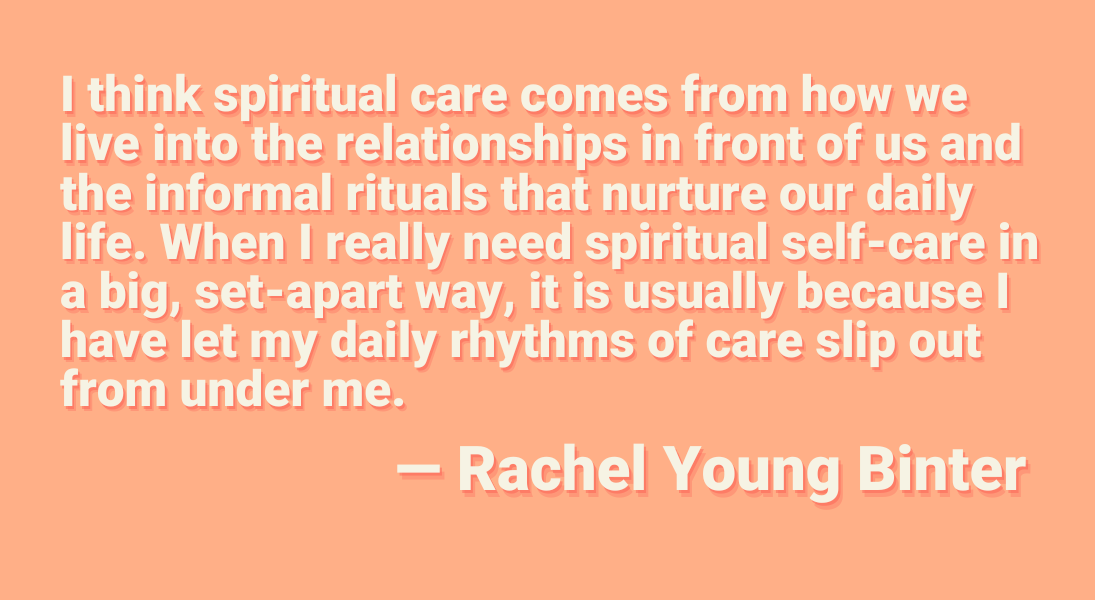
How do you engage in self-care, spiritually?
For me spiritual self-care is usually embodied time. It is that walk in nature where I can be more present to the fullness of the earth and of my heart, or it is time on a yoga mat when I move through what I am holding and release it into something more. It is being in [the] garden at my summer herbal apprentice class, the sun setting, the diverse people of God around me, the earth exploding in abundance and the smell of mint on my fingertips.
I am, however, also fed by my embodied time with the young adults I serve in ministry. I truly love seeing them with their eyes closed and their hearts open at the end of yoga—peace on every face. I love the journaling and drawing and deep personal sharing we do in our cozy prayer room every Monday night, and the collective wisdom of faith and endurance and hope that rises up in our midst.
I love cooking alongside them and hearing the sometimes unexpectedly deep conversations that happen with students who are trying to heal and find their way back into spiritual life as we gather around the table at our free breakfast. I love our beautiful evening worship with fresh-baked communion bread and candlelight, where we begin by breathing in the presence of God and exhaling everything that keeps us from God, so that we can arrive fully present to the love of God all around us.
Mostly, I think spiritual care comes from how we live into the relationships in front of us and the informal rituals that nurture our daily life. When I really need spiritual self-care in a big, set-apart way, it is usually because I have let my daily rhythms of care slip out from under me.
Look for part two—about the specifics of these practices, resources Young Binter recommends, and a meditation she offers—tomorrow.






